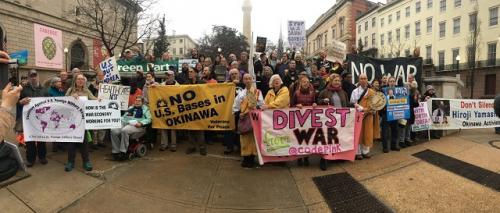Bury the Monroe Doctrine
- Opinión

I get to introduce three terrific speakers to you on the topic of Latin America and the Caribbean, but first I’m allowed to say what I’m thinking for five minutes, so I’ll do that. I’m thinking that the first European bases on this coast were foreign bases, that they moved west, and that the practice has never paused. I live almost next door to the former home of James Monroe whose Monroe Doctrine, as evolved and abused over the centuries, ought to be buried. The U.S. policy of antidemocratically and often violently seeking to dominate the nations to its south, in the name of preventing some other force from doing so, has seen its shelf-life expire. The communism excuse is gone. The terrorism and drugs excuses are weak and getting weaker.
The United States keeps small numbers of troops in almost every country or territory to its south, with the biggest numbers in Puerto Rico, Cuba, Honduras, and El Salvador, with many more within striking distance in Texas and Florida, where the U.S. maintains a command center that claims to command the hemisphere. The U.S. even has use of an island in the middle of the Atlantic that the British used in the Falklands war. And its bases include one at the tip of South America.
Is Latin America a military threat to the United States or the world? Hardly. The threat perceived by some segment of the U.S. is of an influx of refugees from hardships, including mostly human-created disasters, and most of those created in part by U.S. militarism. Of all the world’s big weapons dealers, none are located in Central or South America or the Caribbean. But almost the entire area is sent weapons from the United States. While the U.S. encourages higher military spending in these countries and sets an example by spending over $1 trillion per year itself, Brazil is the only country in the region to spend over 1% of that, or $10 billion. It spends $24 billion. Every nation in this region and on earth spends closer to Costa Rica’s $0 than to the United States’ $1 trillion.
These countries have no nuclear, chemical, or biological weapons. They are almost all members of the International Criminal Court. They tend to belong to more disarmament and human rights treaties than does the United States. Almost all are members of a nuclear free zone. The majority have signed the new nuclear weapons ban treaty. Some have held truth commissions or prosecuted war crimes. People in almost every one have signed our peace pledge at WorldBeyondWar.org. Four years ago this month, 31 Latin American and Caribbean countries declared themselves a zone of peace and committed to not using and to seeking to end war making, and to advancing complete disarmament.
What does this model behavior earn the region from the U.S.? Just since 1945, numerous elections interfered with, assassinations of leaders or attempts in eight countries I know of, overthrown governments or attempts at it in 15 countries I know of, attacks by the U.S. military in 13 countries that I know of. In 2013 Gallup polled in Argentina, Mexico, Brazil, and Peru, and in each case found the United States the top answer to “What country is the greatest threat to peace in the world?” In 2017, Pew polled in Mexico, Chile, Argentina, Brazil, Venezuela, Colombia, and Peru, and found between 56% and 85% believing the United States to be a threat to their country.
This modern imperialism is uniquely U.S.ian, and it may be that communication and organizing is all we need to end it using existing popular sentiment. Maybe we can close the bases because of the ingratitude of foreigners for our imagined generosity. But would such a victory lay the groundwork for good behavior? U.S. exceptionalism that justifies imperial bullying is a prominent sentiment we may have to cure. U.S. nationalism has a religious character, it’s destructive mission is imagined as sacred. Ft. McHenry Baltimore is not a historic site. It is a “National Monument and Historic Shrine.” We may have to learn to value other things, including the other 96% of humanity, before the empire shuts down.
January 13, 2018
- David Swanson is an author, activist, journalist, and radio host. He is director of WorldBeyondWar.org and campaign coordinator for RootsAction.org. Swanson's books include War Is A Lie. He blogs at DavidSwanson.org and WarIsACrime.org. He hosts Talk Nation Radio. He is a 2015, 2016, 2017 Nobel Peace Prize Nominee.
Follow him on Twitter: @davidcnswanson and FaceBook.
http://davidswanson.org/bury-the-monroe-doctrine
Del mismo autor
- Treaties, constitutions, and laws against war 10/01/2022
- The Pentagon and CIA have shaped thousands of Hollywood movies into super effective propaganda 06/01/2022
- Hiroshima is a lie 06/08/2021
- Chile and Colombia to move money out of militaries 17/05/2021
- Blinken Waves Guns, Promising Peace 04/03/2021
- U.S. spends 11 times what China does on military per capita 25/02/2021
- I agree with the Chairman of the Joint Chiefs of Staff on Foreign Bases 09/12/2020
- Bats With Napalm Vests And Other Great American Innovations 17/07/2020
- Long After Hiroshima 07/08/2019
- The Obama Wars 11/07/2019
Guerra y Paz
- Prabir Purkayastha 08/04/2022
- Prabir Purkayastha 08/04/2022
- Adolfo Pérez Esquivel 06/04/2022
- Adolfo Pérez Esquivel 05/04/2022
- Vijay Prashad 04/04/2022
